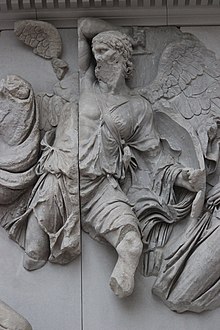
Back Uranos Afrikaans Urán (mitolochía) AN أورانوس (أسطورة) Arabic اورانوس (ميثولوجيا) ARZ ইউৰেনাচ (গ্ৰীক দেৱতা) Assamese Uranu (mitoloxía) AST Uran (mifologiya) Azerbaijani Уран (мифология) Bashkir Uranos BAR Уран (бог) Byelorussian
| Uranus | |
|---|---|
Personification of the Sky and The Heavens | |
| Member of Primordial Gods | |
 Uranus depicted on the Gigantomachy frieze, Pergamon Altar, Pergamon Museum | |
| Abode | Sky |
| Planet | Uranus |
| Genealogy | |
| Parents | Gaia (Hesiod) |
| Siblings | Pontus and the Ourea (Hesiod) |
| Consort | Gaia |
| Children | The Titans, the Cyclopes, the Hecatoncheires, the Erinyes (Furies), the Giants, the Meliae, and Aphrodite[1] |
| Equivalents | |
| Roman | Caelus |
| Greek deities series |
|---|
| Primordial deities |
In Greek mythology, Uranus (/ˈjʊərənəs/ YOOR-ə-nəs, also /jʊˈreɪnəs/ yoo-RAY-nəs),[2] sometimes written Ouranos (Ancient Greek: Οὐρανός, lit. 'sky', [uːranós]), is the personification of the sky and one of the Greek primordial deities. According to Hesiod, Uranus was the son and husband of Gaia (Earth), with whom he fathered the first generation of Titans. However, no cult addressed directly to Uranus survived into classical times,[3] and Uranus does not appear among the usual themes of Greek painted pottery. Elemental Earth, Sky, and Styx might be joined, however, in solemn invocation in Homeric epic.[4] Uranus is associated with the Roman god Caelus.[5][6][7][8]
- ^ According to Hesiod, Theogony 183–200, Aphrodite was born from Uranus's severed genitals, but according to Homer, Aphrodite was the daughter of Zeus (Iliad 3.374, 20.105; Odyssey 8.308, 320) and Dione (Iliad 5.370–71), see Gantz, pp. 99–100.
- ^ "Uranus". Dictionary.com Unabridged (Online). n.d.
- ^ "We did not regard them as being in any way worthy of worship," Karl Kerenyi, speaking for the ancient Greeks, said of the Titans (Kerenyi, p. 20); "with the single exception, perhaps, of Cronos; and with the exception, also, of Helios."
- ^ As at Homer, Iliad 15.36 ff., Odyssey 5.184 ff.
- ^ Grimal, s.v. "Caelus" p. 38.
- ^ Varro, De lingua Latina 5.58.
- ^ Marion Lawrence, "The Velletri Sarcophagus", American Journal of Archaeology 69.3 (1965), p. 220.
- ^ Floro, Epitome 1.40 (3.5.30): "The Jews tried to defend Jerusalem; but he [Pompeius Magnus] entered this city also and saw that grand Holy of Holies of an impious people exposed, Caelum under a golden vine" (Hierosolymam defendere temptavere Iudaei; verum haec quoque et intravit et vidit illud grande inpiae gentis arcanum patens, sub aurea vite Caelum). Finbarr Barry Flood, The Great Mosque of Damascus: Studies on the Makings of an Umayyad Visual Culture (Brill, 2001), pp. 81 and 83 (note 118). El Oxford Latin Dictionary (Oxford: Clarendon Press, 1982, 1985 reprinting), p. 252, entry on caelum, cita a Juvenal, Petronio, and Floro como ejemplos de Caelus o Caelum "with reference to Jehovah; also, to some symbolization of Jehovah."